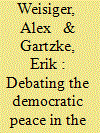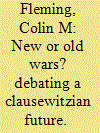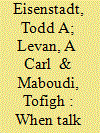|
|
|
Sort Order |
|
|
|
Items / Page
|
|
|
|
|
|
|
| Srl | Item |
| 1 |
ID:
148044


|
|
|
|
|
| Summary/Abstract |
In recent publications, we inquire whether the pacifying effects that are often attributed to democracy are likely to continue to hold as the world democratizes. Critics raise questions about the theoretical logic and especially the empirical results that we present. After clarifying our theoretical arguments, we discuss the central empirical critiques. We demonstrate that Crescenzi and Kadera’s (2016) finding of a pacifying effect of systemic democracy is driven not, as they claim, by the use of a better measure of systemic democracy, but by the unjustified decision to omit systemic regime difference from their analysis. Once we restore this variable, we find no evidence that democratization produces a system-level pacifying effect. We agree with our critics that the inclusion of dyadic regime difference produced misleading estimates for lower-threshold democracy. Because our arguments presume the historical existence of a dyadic democratic peace, however, this observation, if anything, resolves an apparent anomaly for our claims. Finally, we explain that Choi (2016) misunderstands the argument that systemic regime-type difference seeks to capture; we show that his proposed alternative neither captures our concept of interest nor accomplishes what he claims.
|
|
|
|
|
|
|
|
|
|
|
|
|
|
|
|
| 2 |
ID:
087822


|
|
|
|
|
| Publication |
2009.
|
| Summary/Abstract |
Over the last 18 years or so, much of the debate about modern warfare has been about whether it should be described as 'old' or 'new'. However, there has not been a definitive answer as to which best reflects war in the modern world. Increasingly, the alternative arguments are polarised into opposing camps. Indeed, it would be fair to say that there is little in the way of debate at all. By revaluating the strengths and weaknesses of each argument, this paper aims to reinvigorate that discussion by examining whether changes in the way we understand war are really required. Finding that the ideas are not in fact mutually exclusive, it suggests that future research could benefit from a combined approach.
|
|
|
|
|
|
|
|
|
|
|
|
|
|
|
|
| 3 |
ID:
140815


|
|
|
|
|
| Summary/Abstract |
Under what circumstances do new constitutions promote democracy? Between 1974 and 2011, the level of democracy increased in 62 countries following the adoption of a new constitution, but decreased or stayed the same in 70 others. Using data covering all 138 new constitutions in 118 countries during that period, we explain this divergence through empirical tests showing that overall increased participation during the process of making the constitution positively impacts postpromulgation levels of democracy. Then, after disaggregating constitution-making into three stages (drafting, debating, and ratification) we find compelling evidence through robust statistical tests that the degree of citizen participation in the drafting stage has a much greater impact on the resulting regime. This lends support to some core principles of “deliberative” theories of democracy. We conclude that constitutional reformers should focus more on generating public “buy in” at the front end of the constitution-making process, rather than concentrating on ratification and referendums at the “back end” that are unlikely to correct for an “original sin” of limited citizen deliberation during drafting.
|
|
|
|
|
|
|
|
|
|
|
|
|
|
|
|
|
|
|
|
|